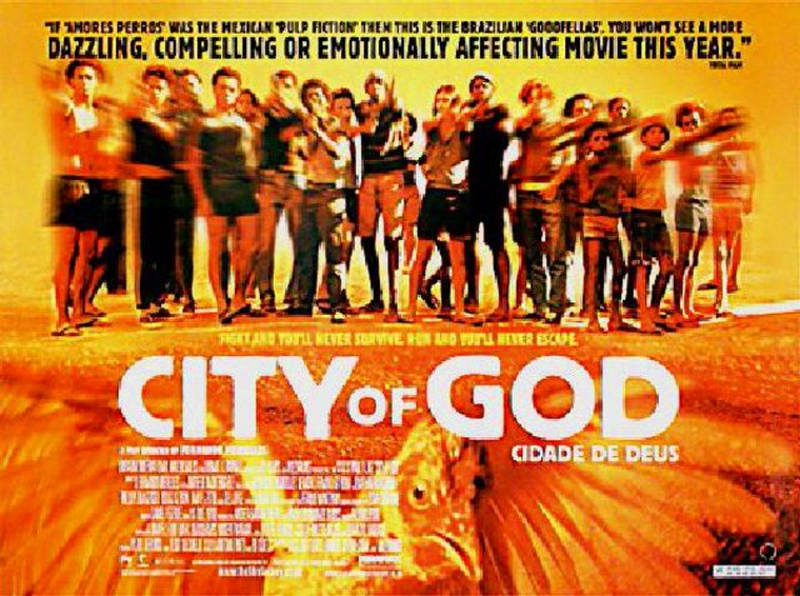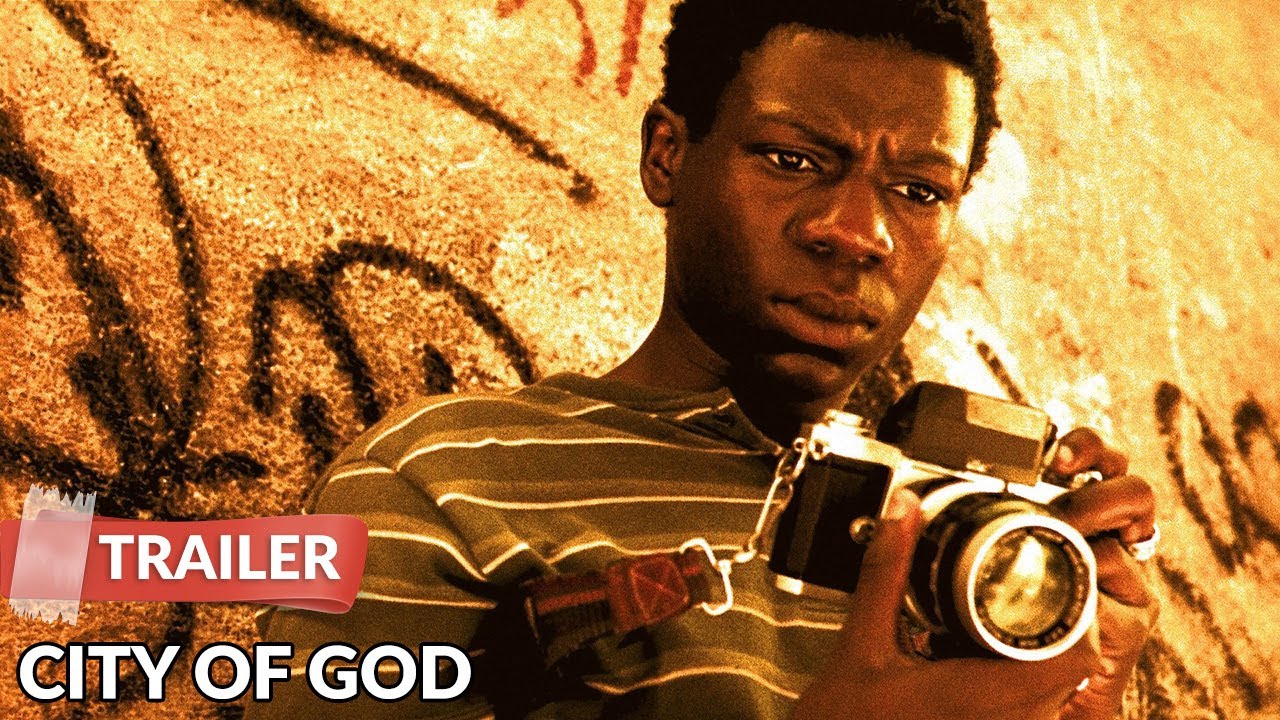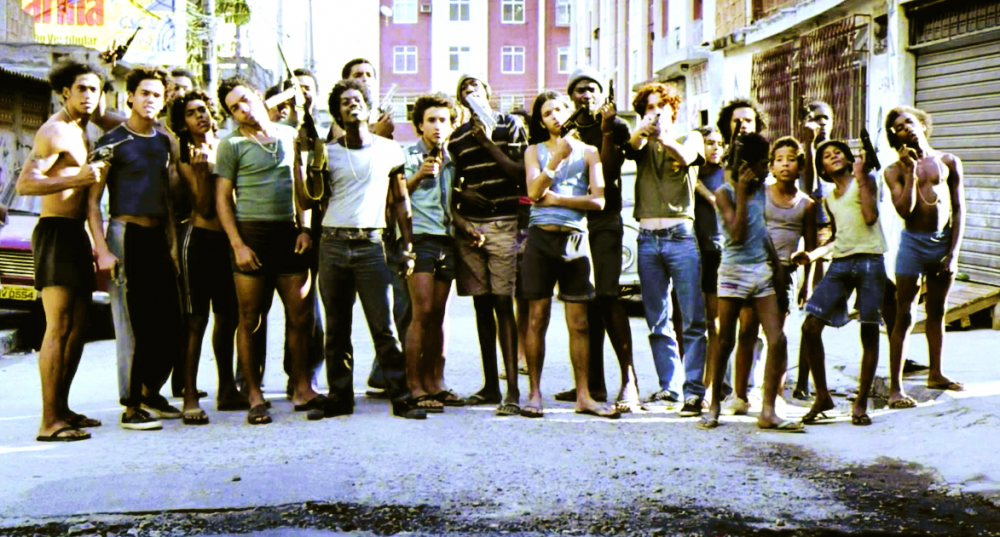🎬 City of God (2002): A Brutal and Unflinching Look at Life in the Favelas

Introduction: Released in 2002 and directed by Fernando Meirelles, City of God (Cidade de Deus) is a raw and visceral depiction of life in the violent slums of Rio de Janeiro. Based on real events and adapted from Paulo Lins’ novel, the film explores the rise of crime and gang warfare in one of Brazil’s most notorious favelas. With its dynamic storytelling, striking visuals, and gripping performances from a mostly non-professional cast, City of God offers a compelling and haunting look at the cycle of poverty, violence, and survival in the slums.
Plot Overview: The film is set in the City of God, a sprawling and impoverished favela on the outskirts of Rio de Janeiro. The story is told from the perspective of Rocket (Alexandre Rodrigues), a young aspiring photographer who dreams of escaping the violence that surrounds him. As Rocket grows up, he witnesses the rise of Lil’ Zé (Leandro Firmino), a ruthless gangster who seizes control of the drug trade in the favela, sparking an all-out war for power.
The narrative follows multiple characters over several decades, showing the transformation of the favela from a community trying to survive to a war zone dominated by fear, drugs, and bloodshed. Rocket’s desire to document the violence through photography provides a unique lens through which the audience experiences the brutal reality of life in the City of God.
Performance and Character Dynamics: The cast, made up largely of non-professional actors from the favelas, delivers remarkably authentic performances. Alexandre Rodrigues portrays Rocket with a quiet intensity, embodying a character who is caught between his desire to escape and his inability to fully detach from the world around him. Rocket’s passion for photography becomes both his salvation and a tool for storytelling, allowing him to survive without succumbing to the violent lifestyle around him.

Leandro Firmino is chilling as Lil’ Zé, a character whose brutality and hunger for power make him one of the most terrifying villains in cinema. His rise to dominance is contrasted by the tragic trajectory of his childhood friend, Benny (Phellipe Haagensen), who longs for a different life but cannot escape the inevitability of violence in the City of God.
The supporting characters, including the idealistic Knockout Ned (Seu Jorge) and the various gang members, add depth to the film, showcasing the different ways individuals are affected by the harsh realities of their environment. The relationships between these characters highlight the complexity of life in the favela, where friendship, betrayal, and survival are intricately intertwined.
Themes and Analysis: City of God is a powerful exploration of the cycle of poverty and violence. The film portrays the systemic forces that trap individuals in a world where crime is often seen as the only path to power and survival. The juxtaposition of Rocket’s peaceful ambitions with Lil’ Zé’s violent rise to power underscores the lack of choices available to those growing up in the favelas.

The film also addresses the impact of drugs and gang warfare on entire communities, illustrating how crime becomes institutionalized in the absence of government intervention or social support. The City of God is depicted as a world where law enforcement is ineffective, and the residents are left to navigate a society ruled by gang leaders.
Through Rocket’s eyes, City of God also serves as a meditation on the role of the observer. Rocket’s photography allows him to document the violence without becoming a direct participant, highlighting the power of storytelling as a means of both survival and resistance. His role as a witness to the chaos offers a glimmer of hope in an otherwise bleak landscape.
Visuals and Cinematic Style: Visually, City of God is a masterclass in dynamic and innovative filmmaking. Meirelles and co-director Kátia Lund use handheld cameras and fast-paced editing to create an immersive and frenetic style that mirrors the chaos of life in the favelas. The use of natural light and real locations adds to the film’s sense of authenticity, making the City of God feel like a living, breathing character in its own right.

The film’s non-linear narrative, which weaves together different stories and timelines, keeps the audience engaged and on edge, reflecting the unpredictable nature of life in the slums. The rapid shifts in tone, from moments of dark humor to scenes of shocking violence, create a visceral and emotionally charged experience.
Film Details:
- Title: City of God (Cidade de Deus)
- Release Date: August 30, 2002
- Directors: Fernando Meirelles, Kátia Lund
- Starring: Alexandre Rodrigues, Leandro Firmino, Phellipe Haagensen, Seu Jorge
- Genre: Crime, Drama
- Runtime: 2h 10m
- Rating: R
Final Thoughts: City of God is a harrowing and unforgettable film that shines a light on the brutal realities of life in the favelas. Its unflinching portrayal of violence, poverty, and the human desire for survival makes it one of the most impactful crime dramas ever made. With its gripping performances, innovative storytelling, and powerful social commentary, City of God remains a landmark in international cinema, forcing audiences to confront the harsh truths about systemic violence and inequality.
SUGGESTED VIDEO FOR YOU:
Movie Review: Survival War In The 333-Story Vertical Prison || The Platform 2
Movie Review: Terrifier 3 (2024): The Return of Art the Clown in a Blood-Soaked Horror Sequel











